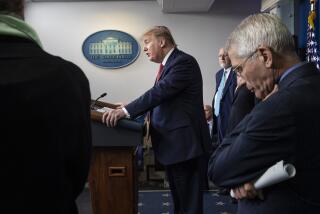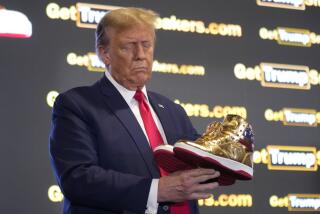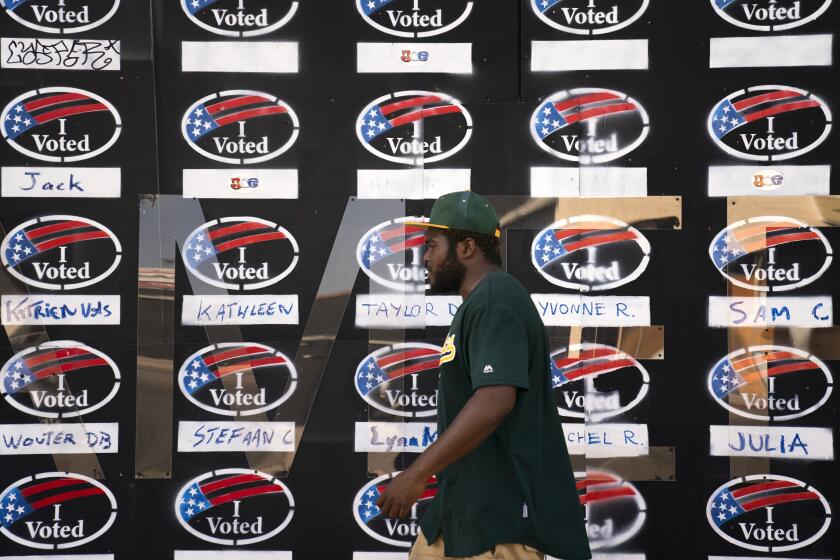Former Fed chief ‘shocked’ by crisis
WASHINGTON — As Federal Reserve chairman, Alan Greenspan testified before Congress on dozens of occasions over almost two decades. Time after time, lawmakers hung on his every word, soliciting the wisdom of “the Oracle” on the economy.
But not Thursday.
This time, instead of praise, angry lawmakers in an ornate hearing room heaped blame on the 82-year-old economist for the current financial crisis and demanded to know how he could have been so wrong.
Grim-faced, Greenspan could offer only a limited defense. In his trademark gravelly monotone, he conceded that he was in a state of “shocked disbelief” at the breakdown of credit markets that triggered what he called “a once-in-a-century credit tsunami.”
“This crisis . . . has turned out to be much broader than anything I could have imagined,” he told the House Oversight and Government Reform Committee. “Given the financial damage to date, I cannot see how we can avoid a significant rise in layoffs and unemployment.”
The appearance was his first in such a public forum since the crisis began and provided a dramatic bookend for the demise of the economic boom and the unmaking of a reputation.
Instead of hanging on Greenspan’s words, some lawmakers pelted him with them, bombarding him with his own past statements downplaying concerns over a housing crash.
Near the end of the four-hour grilling, which he shared with former Treasury Secretary John W. Snow and Securities and Exchange Commission Chairman Christopher Cox, Greenspan suffered a final indignity. The man dubbed “the Maestro” for successfully orchestrating fiscal policy during 18 years as Fed chief found himself likened to one of the great goats of baseball.
“I feel like I’m looking out there at three Bill Buckners,” said Rep. John Yarmuth (D-Ky.), referring to the Boston Red Sox first baseman who botched an easy grounder in the 1986 World Series. “All of you let the ball go through your legs.”
Snow and Cox took a lot of criticism from lawmakers as well. But it was unprecedented to see Greenspan -- the fiscal Hall of Famer of the trio -- being booed for a crucial error.
Under tough questioning from committee Chairman Henry A. Waxman (D-Beverly Hills) and other Democrats, Greenspan conceded that he was wrong in assuming that free-market forces would prevent the current crisis.
“I made a mistake in presuming that the self-interests of organizations, specifically banks and others, were such as that they were best capable of protecting their own shareholders and their equity in the firms,” said Greenspan, who stepped down as Fed chairman in January 2006.
The crisis exposed a “flaw” in his strong market-based ideology, he said.
“That’s precisely the reason I was shocked, because I have been going for 40 years or more with very considerable evidence that it was working exceptionally well,” Greenspan said.
The hearing was the third in a series Waxman is holding to identify the causes of the financial crisis. Greenspan knew he was in for a tough day. And Waxman hit him at the start.
“For too long, the prevailing attitude in Washington has been that the market always knows best,” Waxman said. “The Federal Reserve had the authority to stop the irresponsible lending practices that fueled the subprime mortgage market. But its longtime chairman, Alan Greenspan, rejected pleas that he intervene.”
Greenspan’s critics have complained that he kept interest rates too low starting in 2001 to bolster the U.S. economy after the bursting of the dot-com bubble and the Sept. 11 terrorist attacks. That easy credit, they say, fueled a runaway housing boom. They also allege that his free-market ideology kept him from using Federal Reserve authority to regulate adjustable-rate mortgages and complex financial derivatives -- regulation that could have helped prevent the current crisis.
Throughout the hearing Thursday, however, Greenspan remained unflappable.
As Rep. Dennis J. Kucinich (D-Ohio) ticked off a series of past statements Greenspan made about the housing market -- there is “no evidence that home prices will collapse” (May 2006) and “It looks as though the worst is behind us” (November 2006) -- Greenspan looked on impassively and sipped water.
And he never rose to the bait of angry lawmakers.
“The housing bubble became clear to me sometime in early 2006 in retrospect,” he told Kucinich.
“I did not forecast a significant decline because we had never had a significant decline in prices.”
Greenspan called for some new requirements that companies that package mortgages and other investments into securities retain a stake in those securities. But he cautioned against broader regulations, saying that government action to prevent a rare, “once-in-a-century phenomenon” would be “so onerous as to basically suppress the growth rate in the economy and . . . the standards of living of the American people.”
And he defended the Fed’s ability to detect economic trends, saying it was better than that of the private sector.
“If all those extraordinarily capable people were unable to foresee the development of this critical problem . . . I think we have to ask ourselves why is that,” Greenspan said. “And the answer is that we’re not smart enough as people. We just cannot see events that far in advance. And unless we can, it’s very difficult to look back and say, ‘Why didn’t we catch something?’ ”
In the end, Greenspan said Fed economists -- himself included -- were not perfect.
“If we are right 60% of the time in forecasting, we’re doing exceptionally well. That means we are wrong 40% of the time,” he said. “We can try to do better, but forecasting . . . never gets to the point where it’s 100% accurate.”
--
More to Read
Get the L.A. Times Politics newsletter
Deeply reported insights into legislation, politics and policy from Sacramento, Washington and beyond. In your inbox three times per week.
You may occasionally receive promotional content from the Los Angeles Times.











